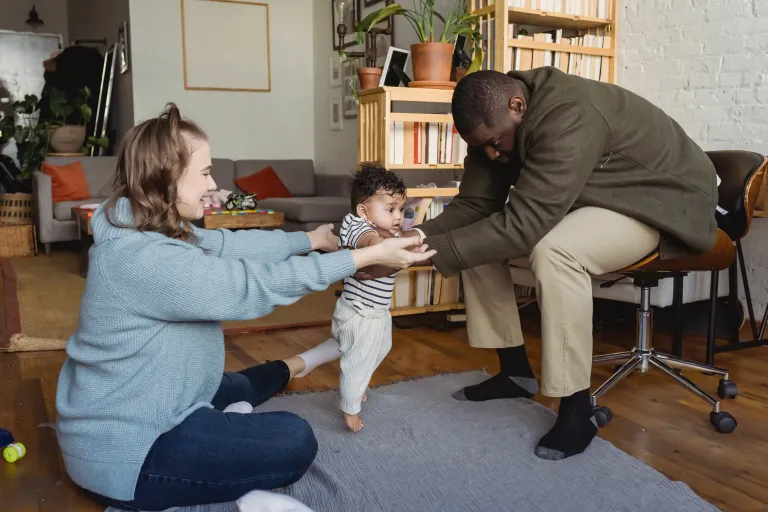
One person wanting kids and the other not can feel like a problem, but it doesn't always have to be. The best thing to do is to sit down and talk openly and non-judgmentally with your partner about it.
What does it mean to want kids
There are many interpretations of ‘wanting kids’. While some people might be absolutely certain that this is something they want and some people might be dead set against it, there are plenty of people who are somewhere in between - who feel they may lean one way or the other but aren’t necessarily totally sure.
The decision to ‘want kids’ isn’t something that happens all by itself. It’s something we decide - or decide against - based on a number of factors. These might include our ideas of what it might be like to have kids, our experiences around children so far in our lives, and, perhaps most importantly, our own upbringings. Having an understanding of these factors - both for yourself and your partner - is important before figuring out what your respective positions mean for your relationship.
Making the time to talk
With this in mind, the best thing to do when it comes to approaching this issue is to sit down with your partner and talk about things properly.
Deciding when to do this can be difficult. While this isn’t something you’ll necessarily want to do in the very early stages of a relationship, it can be a good idea to try have this chat sooner rather than later. It’s obviously tempting to put things off, especially if you’re worried that you won’t come away with a happy outcome but this may be something you end up talking about at one point anyway. You might be glad to confront it before you get too deeply attached.
It’s a good idea to find a time and place to do things - when you’ll be able to give the conversation your full attention, and where you’re less likely to be disturbed. That might mean going for a walk or drive together (often having another activity to do at the same time can make things feel a little less intense too), or just to a cafe or restaurant. It might mean when you’re lying down in bed together.
It’s not usually a good idea to do things right before you have something to do - like leave the house or extremely late at night. And it can be really destructive to bring things up when you’re in the middle of a heated discussion or argument - this can mean you end up saying things you regret, and that you don’t get to explain yourself or listen to each other properly.
Understanding your feelings about children
From there, it’s about approaching the discussion in an open and non-judgmental way. It’s about understanding each other’s perspectives - asking questions, listening to the answers, and then switching roles. It can be tempting to try to push your view on your partner - to try to convince them to feel how you feel - but this is only likely to make them feel defensive or upset. Try to think in terms of being curious: curious about how your partner feels, and interested to understand better.
You might talk about each other’s ideas of what having kids would be like - how it would change your lives, how it would affect your priorities, what kind of sacrifices you might have to make. You might want to talk about kids that are already in your lives and how you relate to them - how you feel when you’re around children. And you’ll probably want to spend at least a little time talking about your upbringings - about your parents, your relationships with them, and how your upbringings have shaped your ideas on family and what being part of a family means.
Some of this stuff can take a little while to understand - indeed, you might not understand your own position completely yet. That’s why it’s important to stay open, calm and curious throughout the discussion so you can help each other explain yourselves and come to a mutual understanding of some of these topics.
Reaching a solution
It’s more about reaching a point where you don’t have to work in confusion or hold separate understandings of what’s going on. If you don’t agree, you may gain a better understanding of why that is, and be able to think if there’s anything you can do about that. If you do agree, you may find out more about the ways in which you agree. And beyond this, you may find that there’s lots of little areas of agreement and disagreement that you weren’t aware of, and that it’s really useful for you both to understand going forward.
Deciding if you want to try for kids or not
Becoming a parent is, in many ways, a radical change to your identity. You and your partner go from being a couple to a family. You go from being primarily responsible for yourself to responsible for another human being.
This can be an invigorating and life affirming experience - but it can come with a range of challenges too, both for you as individuals and for your relationship.
It's also not something everyone wants to take on. For some, the timing isn't right to make that shift from being a couple to being a family. For others, that radical change to their identity isn't something they ever want to make, for others it won't be possible or will take longer than they hoped.
It's a big decision. And we think it's one worth thinking through together. That's why we've designed a resource to help you and your partner do just that. The questions were crafted by our team of relationship therapists, and cover everything from your own families to how you negotiate as a couple.
